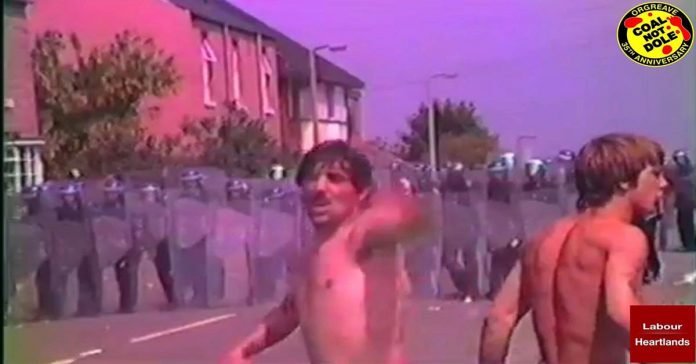Miners and campaigners have spent three decades demanding an inquiry into police actions at the infamous battle at the height of the Miners’ Strike.
Approximately 8,000 pickets faced 6,000 police officers, many mounted in what was regarded as the most violent confrontation in the year-long strike.
The so-called Battle of Orgreave led to 95 people being charged with riot and violent disorders but their cases were dropped amid questions about the reliability of police evidence.
Thousands of officers drafted in, to police the picketing used excessive violence – and that this was followed by the fabrication of accounts during the subsequent investigation.
The miners wanted to stop lorry loads of coke leaving for the steelworks. They thought that would help them win the strike, and help protect their pits and their jobs. The police were determined to hold them back.
The number of officers was unprecedented. The use of dogs, horses and riot gear in an industrial dispute was almost unheard of. Some of the tactics were learned from the police in Northern Ireland and Hong Kong who had experience dealing with violent disorder.
During the subsequent court case, a police manual was uncovered which set out the latest plans to deal with pickets and protests.
Police vans and Range Rovers were fitted with armour so they could withstand the stones being thrown by some in the crowd. The miners suspected the whole operation was being run under government control.
Many believe Orgreave was the first example of what became known as “kettling” – the deliberate containment of protesters by large numbers of police officers. It marked a turning point in policing and in the strike.
It was the moment the police strategy switched from defensive – protecting collieries, coking plants and working miners – to offensive, actively breaking up crowds and making large numbers of arrests. In many mining communities faith in the police was destroyed, a legacy that lasts to this day.
There were questions in court about the reliability of the police evidence. Many of the statements made by officers were virtually identical. At least one had a forged signature.
Eventually, the case was thrown out and the arrested miners were cleared.
Orgreave Truth and Justice Campaign
Former miners and their families demanded a Hillsborough-style probe to look at how South Yorkshire Police – the same force involved at Hillsborough and how they behaved before, during and after the 1984 Battle.
Campaigners demanded a public inquiry to determine exactly what happened, but they were disappointed when Rudd then Home Secretary, ruled this out in 2016 saying “ultimately there were no deaths or wrongful convictions” resulting from the events of 1984 saying there was “not a sufficient basis” for a review.
But a book by the wife of a Tory MP claims the real reason Ms Rudd scrapped the probe was because it would “slur the memory of Thatcher” and upset party members.
Sasha Swire, the wife of Tory MP Hugo Swire, says Ms Rudd made the admission during a “kitchen supper” on September 20, 2016 – shortly after Ms Rudd was promoted to Home Secretary by Theresa May.
She wrote: “She tells me she loves all the James Bond stuff, the MI5 and MI6 briefings.
“But Amber’s immediate concern is the number of potential inquiries that need decisions on whether they go ahead. Most of them she inherited from her predecessor, who kicked them into the long grass.
“Orgreave would slur the memory of Thatcher and the party won’t like it.
Speaking about the revelation Andy Burnham said: “It’s kind of an interesting and quite revealing read because it does reveal how this country is run, and how the other half who are running the country are living.”
He added: “We suspected it at the time. In the House of Commons she said we wouldn’t have an inquiry into Orgreave because nobody died.
“Actually, behind closed doors, it was about ‘Margaret’s legacy being tarnished’, and that’s why everybody needs to continue to support the Orgreave Truth and Justice campaign because that will tell you how this country is run.”
A spokesperson for the Orgreave Truth and Justice Campaign said: “We believe that Amber Rudd refused an Orgreave Inquiry because she was pressured by the establishment and heavily influenced by Tory ministers from the Thatcher era who would rather cover up the past than reveal and admit the wrongdoings of the past.
The truth is senior Tories rejected an inquiry into the Battle of Orgreave because it would tarnish Margaret Thatcher’s memory, it has been claimed.
Find out more about Orgrave Truth and Justice Campagne here
Support Independent Journalism Today
Our unwavering dedication is to provide you with unbiased news, diverse perspectives, and insightful opinions. We're on a mission to ensure that those in positions of power are held accountable for their actions, but we can't do it alone. Labour Heartlands is primarily funded by me, Paul Knaggs, and by the generous contributions of readers like you. Your donations keep us going and help us uphold the principles of independent journalism. Join us in our quest for truth, transparency, and accountability – donate today and be a part of our mission!
Like everyone else, we're facing challenges, and we need your help to stay online and continue providing crucial journalism. Every contribution, no matter how small, goes a long way in helping us thrive. By becoming one of our donors, you become a vital part of our mission to uncover the truth and uphold the values of democracy.
While we maintain our independence from political affiliations, we stand united against corruption, injustice, and the erosion of free speech, truth, and democracy. We believe in the power of accurate information in a democracy, and we consider facts non-negotiable.
Your support, no matter the amount, can make a significant impact. Together, we can make a difference and continue our journey toward a more informed and just society.
Thank you for supporting Labour Heartlands












